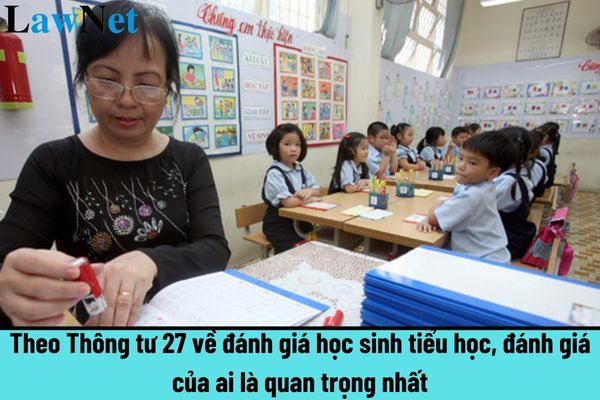Who gives the most important assessments under Circular 27 on primary school student assessment in Vietnam?
Who gives the most important assessments under Circular 27 on primary school student assessment in Vietnam?
Under Article 4 of Circular 27/2020/TT-BGDDT, the requirements for assessing primary school students in Vietnam are as follows:
Assessment requirements
1. Assess students via level of satisfaction of requirements and specific display of capacities in subjects, academic activities, traits and capabilities of students required by formal primary education program.
2. Conduct regular assessment by feedback, periodic assessment in form of scores in combination with comments; combine assessment of teachers, students, students' parents in which teachers’ assessment holds the highest priority.
3. Assess progression and do so for the progression of students; emphasize encouragement and motivation of efforts in studying and training of students; assist students in making the best of their capabilities and efforts; guarantee timeliness, fairness and transparency; refrain from comparing one student to another, refrain from pressuring students, teachers or students' parents.
Under the assessment requirements mentioned above, it will conduct regular assessment by feedback, periodic assessment in form of scores in combination with comments; combine assessment of teachers, students, students' parents in which teachers’ assessment holds the highest priority.

Who gives the most important assessments under Circular 27 on primary school student assessment in Vietnam? What are the 04 assessment methods for primary school students in Vietnam according to Circular 27? (Image from the Internet)
What are the 04 assessment methods for primary school students in Vietnam according to Circular 27?
Under Clause 2, Article 5 of Circular 27/2020/TT-BGDDT, some commonly used methods in the assessment of students in Vietnam include:
1) Assessment by observation: Teachers monitor and listen to students when teaching in classes, employ observation cards, examination boards and records of student's behaviors as proof for assessment of studying and training processes of students.
2) Assessment by academic records, products and activities of students: Teachers provide feedback and assessment regarding products and activity results of students thereby assessing students based on relevant assessment criteria.
3) Assessment by communication: Teachers discuss with students in form of questions and answers to collect information and promptly provide comment, remedial measures.
4) Assessment by writing: Teachers employ tests consisting of questions and exercises designed according to levels and requirements to be achieved of the program in form of multiple-choice questions and writing tests to assess level of completion for academic assessment criteria.
What are the specific objectives of assessing primary school students in Vietnam?
Pursuant to Article 3 of Circular 27/2020/TT-BGDDT, the specific objectives of assessing primary school students in Vietnam are:
- Assist teachers in adjusting and renovating organization format and education methods in teaching and academic processes; promptly acknowledge efforts and progress of students to motivate, encourage and detect insurmountable obstacles of students to guide, support in order to improve studying and training effectiveness of students; in part to implement objectives of primary education level.
- Help students develop ability to self-reflect, reflect, self-study, adjust studying methods, communicate, cooperate, interest in learning and training for improvement.
- Assist student’s parents or guardians (hereinafter referred to as “student’s parents”) in assessing studying, training progress and results, processes of forming and developing traits, capacities of students; actively cooperating with schools in educating students.
- Assist education management officials of all levels to promptly direct education activities, renovate teaching methods and assessment methods to achieve education effectiveness.
- Assist social organization in acknowledging accurate and objective information, develop social sources for investment in development of education.

